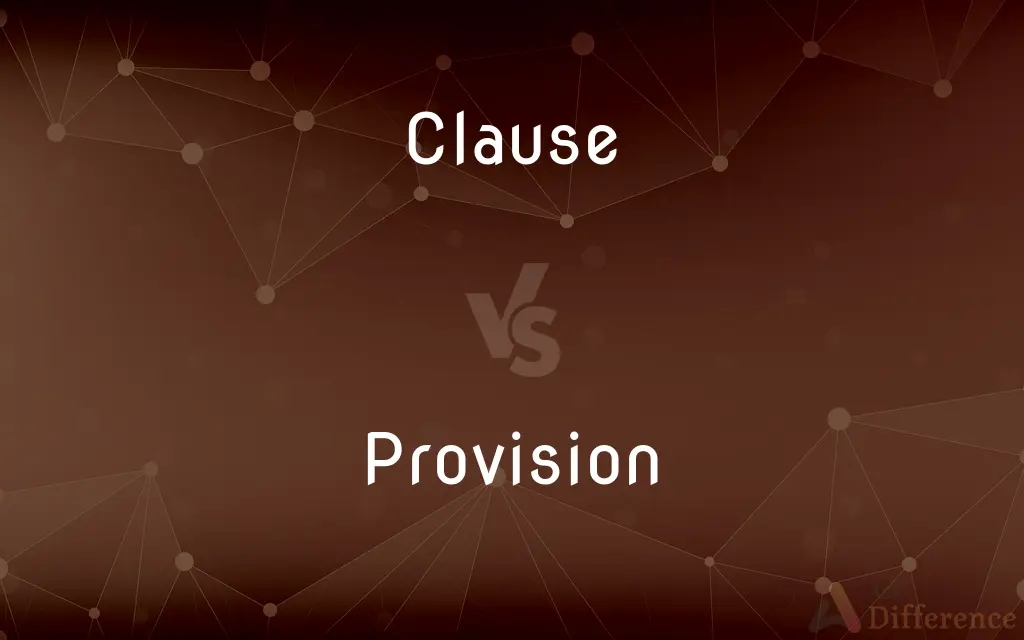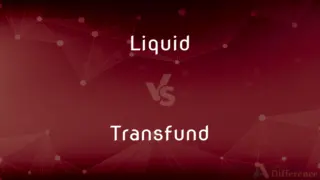Clause vs. Provision — What's the Difference?
By Fiza Rafique & Maham Liaqat — Updated on March 18, 2024
A clause is a specific section within a legal document that details a particular point or condition, while a provision is a term or condition in a legal agreement that stipulates obligations, rights, or restrictions.

Difference Between Clause and Provision
Table of Contents
ADVERTISEMENT
Key Differences
Clauses are integral components of contracts and legal documents, each serving as a building block that addresses a specific aspect of the agreement, such as payment terms, termination conditions, or confidentiality requirements. Provisions, however, encompass a broader range of terms and conditions within an agreement, which can include clauses, covenants, and legal stipulations designed to protect the interests of the parties involved.
While a clause is often seen as a specific statement within a document, provisions are more about the overall terms set out in the agreement, covering a wide array of conditions and obligations. This means that all clauses can be considered provisions, but not all provisions are clauses, as provisions may also include broader legal stipulations that aren't confined to a single point.
The purpose of a clause is to clearly define a particular element or condition of the agreement, making sure each party understands their rights, responsibilities, and the scope of the agreement. On the other hand, provisions are used to establish the general framework of the agreement, including the scope of work, legal protections, and the mechanisms for resolving disputes.
In drafting and interpreting legal documents, the distinction between clauses and provisions is crucial for understanding the structure and enforceability of the agreement. Clauses are typically more narrowly focused and detail-oriented, whereas provisions can set forth broader principles and requirements that govern the entire agreement.
Both clauses and provisions are essential for the clarity, enforceability, and effectiveness of legal agreements. They work together to ensure that all aspects of the agreement are comprehensively covered, from the specifics of performance to the broader legal frameworks that support the contract's objectives.
ADVERTISEMENT
Comparison Chart
Definition
A specific section in a legal document detailing a particular point
A term or condition in a legal agreement stipulating obligations
Scope
Narrow, focusing on a specific aspect
Broad, covering terms, conditions, and legal stipulations
Examples
Payment terms, termination conditions, confidentiality
Covenants, warranties, indemnifications
Purpose
To define particular elements or conditions of the agreement
To establish the general framework and terms of the agreement
Role
Building blocks addressing specific points
Terms setting out obligations, rights, and restrictions
Compare with Definitions
Clause
Clarifies and details a particular aspect of the agreement for clear understanding.
The termination clause specifies conditions under which the contract may be ended.
Provision
Can be broad, covering various obligations, rights, and legal stipulations.
Provisions in a lease agreement might cover rent, maintenance, and use of property.
Clause
Highly specific, often dealing with a single condition or requirement.
The arbitration clause defines the process for resolving disputes outside of court.
Provision
Integral to contracts to define the scope of work, legal protections, and dispute mechanisms.
The lease agreement includes provisions for lease duration, payment terms, and conditions for renewal.
Clause
Used in various agreements to detail obligations, rights, or procedures.
The delivery clause in the supply contract specifies timing, method, and place of delivery.
Provision
Sets the overall obligations, protections, and scope of the legal document.
Provisions related to dispute resolution outline the process for handling disagreements.
Clause
A distinct section of a contract or legal document addressing a specific point.
The non-disclosure clause strictly outlines confidentiality requirements.
Provision
A term or condition within an agreement that outlines obligations or restrictions.
The indemnification provision protects against losses from breaches of the contract.
Clause
Ensures precision and clarity for specific terms of the contract.
The payment clause delineates the schedule and methods of payment between the parties.
Provision
Establishes the framework and general terms of the agreement.
The warranty provision outlines the guarantees provided for the goods or services.
Clause
In language, a clause is a constituent that links a semantic predicand (expressed or not) and a semantic predicate. A typical clause consists of a subject and a syntactic predicate, the latter typically a verb phrase, a verb with any objects and other modifiers.
Provision
The act of providing or supplying something
The provision of health care.
The provision of rations.
Clause
(Grammar) A group of words containing a subject and a predicate and forming part of a compound or complex sentence.
Provision
The act of making preparations for a possible or future event or situation
The provision for retirement requires planning.
Clause
A distinct article, stipulation, or provision in a document.
Provision
Something provided
A fire escape is an important provision in a building.
Clause
(grammar) A verb, its necessary grammatical arguments, and any adjuncts affecting them.
Provision
Provisions Necessary supplies, such as food and clothing, as for a journey.
Clause
(grammar) A verb along with its subject and their modifiers. If a clause provides a complete thought on its own, then it is an independent (superordinate) clause; otherwise, it is (subordinate) dependent.
Provision
A preparatory action or measure
We must make provisions for riding out the storm.
Clause
(legal) A separate part of a contract, a will or another legal document.
Provision
A particular requirement in a law, rule, agreement, or document
The constitutional provision concerned with due process.
Clause
To amend (a bill of lading or similar document).
Provision
To supply with provisions.
Clause
A separate portion of a written paper, paragraph, or sentence; an article, stipulation, or proviso, in a legal document.
The usual attestation clause to a will.
Provision
To take preparatory action or measures
A bank must provision against losses from bad loans.
Clause
A subordinate portion or a subdivision of a sentence containing a subject and its predicate.
Provision
An item of goods or supplies, especially food, obtained for future use.
Clause
See Letters clause or Letters close, under Letter.
Provision
The act of providing, or making previous preparation.
Clause
(grammar) an expression including a subject and predicate but not constituting a complete sentence
Provision
Money set aside for a future event.
Clause
A separate section of a legal document (as a statute or contract or will)
Provision
(accounting) A liability or contra account to recognise likely future adverse events associated with current transactions.
We increased our provision for bad debts on credit sales going into the recession.
Provision
(law) A clause in a legal instrument, a law, etc., providing for a particular matter; stipulation; proviso.
An arrest shall be made in accordance with the provisions of this Act.
Provision
(Roman Catholicism) Regular induction into a benefice, comprehending nomination, collation, and installation.
Provision
A nomination by the pope to a benefice before it became vacant, depriving the patron of his right of presentation.
Provision
(transitive) To supply with provisions.
To provision an army
Provision
To supply (a user) with an account, resources, etc. so that they can use a system.
Provision
The act of providing, or making previous preparation.
Provision
That which is provided or prepared; that which is brought together or arranged in advance; measures taken beforehand; preparation.
Making provision for the relief of strangers.
Provision
Especially, a stock of food; any kind of eatables collected or stored; - often in the plural.
And of provisions laid in large,For man and beast.
Provision
That which is stipulated in advance; a condition; a previous agreement; a proviso; as, the provisions of a contract; the statute has many provisions.
Provision
A canonical term for regular induction into a benefice, comprehending nomination, collation, and installation.
Provision
A nomination by the pope to a benefice before it became vacant, depriving the patron of his right of presentation.
Provision
To supply with food; to victual; as, to provision a garrison.
They were provisioned for a journey.
Provision
A stipulated condition;
He accepted subject to one provision
Provision
The activity of supplying or providing something
Provision
The cognitive process of thinking about what you will do in the event of something happening;
His planning for retirement was hindered by several uncertainties
Provision
A store or supply of something (especially of food or clothing or arms)
Provision
Supply with provisions
Common Curiosities
How do clauses and provisions affect the interpretation of a contract?
They are fundamental to understanding the rights, obligations, and procedures outlined in a contract, affecting how it's enforced and interpreted.
Can a legal document contain both clauses and provisions?
Yes, most legal documents will contain both clauses and provisions to detail and govern the agreement fully.
Are provisions legally binding?
Yes, provisions are legally binding terms and conditions that dictate the obligations and rights of the parties involved.
What is the main difference between a clause and a provision?
A clause is a specific section detailing a point, while a provision is a broader term for conditions and obligations in an agreement.
What role do provisions play in contract disputes?
Provisions, including specific clauses, are crucial in resolving disputes as they outline the agreed terms and mechanisms for resolution.
Can clauses and provisions be modified after a contract is signed?
Modifications typically require agreement from all parties involved, often documented through amendments to the original contract.
Can a clause be considered a provision?
Yes, all clauses can be considered as provisions, but not all provisions are clauses, as provisions may include broader legal stipulations.
How specific are clauses compared to provisions?
Clauses are typically more specific, focusing on a single aspect, while provisions can encompass broader terms and conditions of the agreement.
Why is it important to clearly define clauses and provisions in a contract?
Clear definitions ensure both parties understand their rights and obligations, reducing the potential for disputes and facilitating enforcement.
How do clauses and provisions impact contract negotiation?
They are key negotiation points that define the scope, obligations, and rights within the agreement, influencing its terms and conditions.
Share Your Discovery

Previous Comparison
Diaphane vs. Stuff
Next Comparison
Liquid vs. TransfundAuthor Spotlight
Written by
Fiza RafiqueFiza Rafique is a skilled content writer at AskDifference.com, where she meticulously refines and enhances written pieces. Drawing from her vast editorial expertise, Fiza ensures clarity, accuracy, and precision in every article. Passionate about language, she continually seeks to elevate the quality of content for readers worldwide.
Co-written by
Maham Liaqat













































